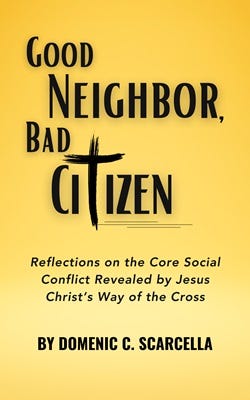If you enjoy this article, please click Like (❤️) to help others find my work.
Pope Francis passed away this week.
When I heard, I did what I always do when I learn the name of someone who dies: I prayed an Our Father for his soul, and went about my day. I didn’t know Jorge Mario Bergoglio personally had no real relationship to him outside of hearing about him in the news.
Though Catholic, I’m not a Papist. Yes, those are different. Papists are those who treat the Roman Catholic Church as if it’s a collectivist entity with identity-politics goals, and treat the Pope as its party boss. Many to most practicing Catholics I know are, sadly, Papists.
But I’m simply not into any cult of personality (unless it’s the song by Living Colour, embedded at top of this article). I don’t like celebrity culture and make no exception for “Christian” celebrity culture.
My sometimes-messy assent to the truth, goodness and beauty beyond the merely mortal (as revealed by Jesus), and my gratefulness for those who accept the responsibility of serving others on the journey (the purpose of Church), doesn’t degrade into degrees of idolatry.
There seems to be a near-universal human allure to putting some people on pedestals and building belief systems around social stratification. Respecting a person is fine; cultish fawning over a person or group of people isn’t so fine, especially if comes with a power fetish.
Qualities people admire — artistic or entertainment ability, athletic or intellectual prowess, social conquest, material gains, physical attractiveness, etc. — can go from good to pathological. And the inflection point isn’t always obvious for those immersed in it.
For instance, intelligence is generally considered a good thing. In the days of the ancient Greeks, some people prized intelligence so much that they desired to be ruled by, as Plato put it, a celebrated class of “Philosopher Kings.” In modern times, this fascination with alleged experts can manifest as technocracy.
Can you see where the respect of a good quality — in this example, intelligence — becomes a pathology?
The anarchist-minded probably noticed it right away.

Christianity vs. Christian-flavored idolatry
Unfortunately, many Christians respond to celebrity culture not by rejecting it but by creating their own “Christian” celebrities to idolize. Saints and Popes can be objectified in this manner, sadly.
It reminds me of how important it is for leaders to be humble! How does a person of exceptional ability and achievement continue to do good things without becoming prideful and vain over the idolization that others are all too willing to provide?
A good lead-by-example model can be found in the Gospels. Jesus not only navigates the cult-like reactions of people during His public ministry, but continues after His death. No bitterness toward the people who failed Him. Simultaneously, no triumphant public spectacles, either.
The Gospels even record the risen Jesus being so unassuming that people who knew Him have trouble recognizing Him (Luke 24:15-16; John 20:15, 21:4).
As I did last year for the Wednesday of Paschal Week, I’d like to print an excerpt from the final chapter of my book, which focuses on how Jesus treats people after His victory over death.
It’s easy to make idols out of people and things, and to desire imposed, hierarchical social orders (governments!) to force matters to our liking. It’s often more challenging to keep things in well-grounded, humble perspective, and to find the truth, beauty and goodness in life.
Here’s to avoiding the former and seeking the latter!

From the Good Neighbor, Bad Citizen book
Preface to Chapter 5: Mercy
Sentencing.
Sharing.
Courage.
Hatred.
And, finally, Mercy.
Adoration and praise recognize the good and wonderful things that people do. But to show mercy is to love people in their imperfections.
All humans — full of flaws and other limitations — need mercy. Fortunately, God has inexhaustible love, inexhaustible mercy, for people. Even more fortunately for earthly lifespans, humans can learn mercy and then practice mercy toward others.
It’s true that people can commit terrible sins, and so create glimpses of Hell on earth.
But people can also create glimpses of Heaven on earth, through acts of love, especially mercy.
…
BONUS STATION – Jesus lives!
John 20:18-21: 18 Mary of Magdala went and announced to the disciples, “I have seen the Lord,” and what he told her. 19 On the evening of that first day of the week, when the doors were locked, where the disciples were, for fear of the Jews, Jesus came and stood in their midst and said to them, “Peace be with you.” 20 When he had said this, he showed them his hands and his side. The disciples rejoiced when they saw the Lord. 21 [Jesus] said to them again, “Peace be with you. As the Father has sent me, so I send you.”Of all the accounts of Jesus’ resurrection in the canonical Gospels, John’s provides the most dialogue between Jesus and His disciples.
All mention the empty tomb on the Sunday (the first day of the week), following Jesus’ death on Friday (the day before the Sabbath). But every Gospel contains something that the others don’t. Taking each into consideration, a wonderfully robust picture of Jesus’ defeat of death emerges, in the same way that a more panoramic view of Jesus’ full mission and message occurs from examining the entirety of all four Gospels.
Matthew explicitly mentions the Trinity and its invocation in the sacrament of Baptism (Matthew 28:19) as signs of new life to be practiced in the Church.
Mark adds that the risen Jesus initially “rebuked them for their unbelief and hardness of heart” (Mark 16:14), showing how Jesus’ closest friends still have some worries and doubts, and gradually reach the peace of knowing Jesus has overcome death for them.
Luke gives a beautiful account of the appearance of Jesus to two followers who flee Jerusalem soon after His crucifixion. This encounter on the road to Emmaus (Luke 24:13-35) reveals an order of liturgy that is still in use today in Eucharistic celebrations.
And John, more than any of the other Gospel writers, emphasizes Jesus’ mercy, and not only the repeated greeting of “Peace be with you.” There’s also the care He shows the distraught Mary of Magdala at the empty tomb (John 20:14-17); the extra patience He gives the tardy Thomas, who feels left out after hearing his brothers rejoicing (John 20:24-29); and the offer of penance and reconciliation He extends to Peter for denying Jesus during His trials (John 21:15-19).
Considered together, it is clear how very much Jesus loves people in their imperfections. He extends grace, service, and redemption to all who will accept His gifts.
God is never outdone in good neighborliness.
God is never outdone in mercy.
No idols here, but we do have Comments!
What do you think of celebrity culture? Of expert culture? Of technocracy?
If your views have changed, do you recall if there were events in your life that led to your shifting perspective?
Anything else you want to talk about?
Let me know your thoughts below …
—
My book, Good Neighbor, Bad Citizen, is available at:
· Amazon (paperback & Kindle)
· Barnes&Noble (paperback)
· Lulu (paperback)
Find me on X: GoodNeighBadCit
And, as always: Be a good neighbor, even if it makes you a bad citizen.





A Catholic but not a Papist! A very succinct rejection of idolatry. How very easy it is to fall into that trap, whether the idol is a set of ink stained wood pulp pages, or a multicolored cloth, or a magnificent building or device. And how easy to fall into the anti-trap, where one destroys beautiful things or prohibits their production just because some might idolize those objects.
It was a great live performance Saturday of Mania